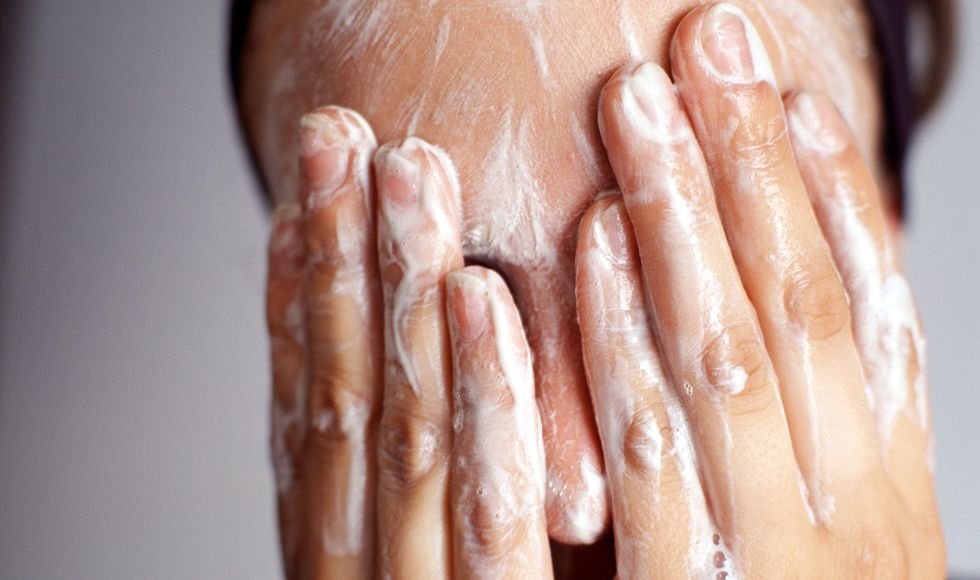We have billions of bacteria that live on our skin; collectively, they’re known as the skin microbiome. Although bacteria are often thought of as a bad thing – like causing infections and contributing to acne – cleansing too much or using the wrong skincare can worsen your skin condition by damaging your skin barrier and reducing the diversity of the skin microbiome.
The good guys vs the bad guys.
A healthy skin microbiome is all about balance. Yes, there are bacteria we definitely don’t want as they cause infections and illness (the bad guys), but many other strains offer benefits to our skin (the good guys). A low amount of beneficial bacteria gives the not-so-beneficial bacteria a chance to thrive, causing an imbalance known as dysbiosis. When the balance of good bacteria on the skin is correct, people are less likely to experience skin conditions.
The functions of a healthy skin microbiome.
Promoting the growth of beneficial bacteria on our skin can offer us amazing beauty benefits. I know – it sounds gross that we have bacteria crawling around on our faces – but we need them! So here are a few benefits a healthy skin microbiome can provide that might help you come around to the idea.
Protect against infections
A healthy skin microbiome helps protect against infections, similar to how the gut microbiome supports our immune system. Promoting the growth of those beneficial bacteria helps to crowd out the bad bacteria – meaning there’s no space for them to set up camp on our skin. Also, the beneficial bacteria can release toxic chemicals (known as antimicrobial peptides) that kill off bad bacteria if they do manage to find a place to live on our skin. For example, Staphylococcus hominis has been shown to secrete antimicrobial molecules that kill S. aureus, a bacteria linked to eczema.
These bacteria on our skin also help to keep the skin’s pH more acidic (protecting our acid mantle), favouring the growth of good bacteria.
Provides a healthy skin barrier
People with eczema are known to have a disrupted skin barrier. This means there are gaps between the skin cells, allowing particles to pass through and causing irritation and inflammation. Visibly this can look like dry, cracked and inflamed skin. But people with acne can also have a damaged skin barrier – it presents itself differently. Some signs of a damaged skin barrier include:
- Itchy skin or rashes
- Dry, dehydrated or flaky skin
- Slow wound healing
- Rosacea, eczema or acne
- Redness
- Uneven skin texture
- Increased sensitivity of the skin
A skin microbiome made up of beneficial bacteria helps to keep skin cells tightly packed together, preventing water loss and resulting in smoother, balanced, healthy skin.
Reduces inflammation of the skin
As mentioned above, a healthy skin microbiome can help reduce skin inflammation by fighting off bad bacteria and promoting a healthy skin barrier. In addition, bacteria on the skin feed information to our immune system, so having a healthy skin microbiome doesn’t just promote great skin; it also supports general immunity. Throwing off the balance of your skin’s microbiome could affect how well your skin repairs – because it’s influencing your immune system.
How to promote a healthy skin microbiome
Get your skincare products from a professional.
And not just any skincare professional, from someone who cares about your skin barrier. Your skincare routine can make or break your skin barrier. While things like antibacterial washes, gels and certain acids can be fantastic for reducing acne – overuse of these products can start to kill off the beneficial bacteria on your skin and damage the skin barrier. In the long term, you may find they stop working; your skin becomes sensitive, or your acne returns.
Look after your gut.
Our gut bacteria can influence the bacteria on our skin, so ensuring that you’re eating a wide range of fruits and vegetables is essential to provide prebiotic fibres (fertiliser to help bacteria grow), promoting a diverse microbiome in our gut and skin. If you want to look a little deeper into the exact balance of your gut bacteria, stool testing can help identify the balance of your gut bacteria and which probiotics are best for you.
Add in some probiotics.
Probiotic skincare is fairly new in the skincare world, but it’s showing promising results already. If you’re looking to add in skincare, always get advice from a professional.
Probiotic foods are a great way to give your microbiome a boost. These include things like miso, kombucha, kimchi, sauerkraut and kefir.
Work up a sweat.
Exercise positively affects our microbiome, increasing the diversity and beneficial bacteria. So move your body in any way you can and in ways that you enjoy!





0 Comments